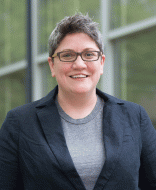
Applying data science in the public interest
July 27, 2018
ANN ARBOR— NSF grant will fund research to advance data science training in public sector.
Data science, once largely restricted to computer labs and geek speak, has arrived in the public square – in city halls, schools and government agencies.
But many people working in these sectors have inadequate computational and data science research skills. At the same time, many researchers and educators struggle to analyze data generated by government organizations on crucial issues such as land use, constituent service requests, and employment statistics.

Libby Hemphill
A new project at the University of Michigan School of Information (UMSI) addresses that gap, and more.
The National Science Foundation has awarded UMSI researchers a $498,778 grant for the project “CyberTraining: CIU: Preparing the Public Sector Research Workforce to Impact Communities through Data Science.” The project will produce “innovative and scalable” instructional materials – including two MOOCs (massive open online courses) – to increase data science literacy among postsecondary students and researchers.
The project will tap the expertise of UMSI’s Citizen Interaction Design (CID) program, and the Inter-university Consortium for Political and Social Research’s (ICPSR) Summer Program in Quantitative Methods.
UMSI faculty on the grant are Libby Hemphill, principal investigator; and Clifford Lampe and Christopher Brooks, co-principal investigators. Lampe is CID founder; Brooks specializes in MOOCs. Lynette Hoelter of ICPSR is also co-principal investigator.
“Though policymakers are increasingly aware of the need to use data to inform policy, many lack the experience, expertise, and resources to manage and use data effectively,” says Hemphill, also an ICPSR faculty member and director of ICPSR’s Resource Center for Minority Data. “Support for data-driven policymaking is growing throughout the country. Constituents and policymakers alike recognize that data can help decision makers choose, fund and evaluate public programs so that they operate effectively.”
The project will advance the state of the art in data science training, especially for public sector researchers. It will design and develop tools that enhance data literacy in the public sector research workforce. It will also increase the accessibility of data science training materials.
Here at U-M, Hemphill adds, “I thought this project could meet two goals. I want to build more connections and collaboration between UMSI and ICPSR, and civic data seemed like a natural fit. The team on this project is just incredible, and the project started by trying to find a way to bring us all together.”
Also, she says, “U-M is a public university and UMSI especially takes its public service responsibilities seriously. And ICPSR is very interested in supporting education around data literacy, administrative data and using data in policymaking.”
The major goal, as Hemphill puts it, is “to build a data culture” in communities. “The ability to share data among citizens, government agencies, researchers and educators creates potential for new research collaborations with significant real- world impact.”
Libby Hemphill is UMSI associate professor of information and directs the Resource Center for Minority Data at ICPSR; Christopher Brooks is UMSI research assistant professor; Cliff Lampe is UMSI associate professor of information; Lynette Hoelter is assistant research scientist at ICPSR and intermittent lecturer in Urban and Regional Planning, A Alfred Taubman College of Architecture and Urban Planning. ICPSR is a center within the U-M Institute for Social Research.
Contact: Sheryl James, UMSI PR Specialist
Related Item:
Bots put the brakes on bad online behavior
Mozilla awards Libby Hemphill a grant to employ tools to diffuse hostile exchanges on social media. read more>>
